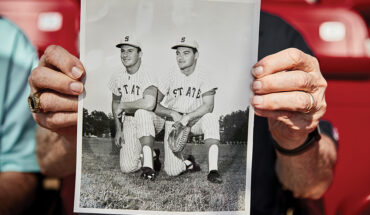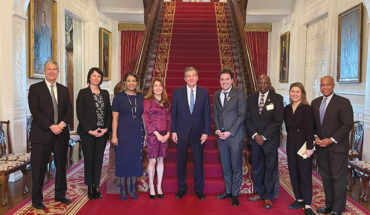A Triangle-based Hollywood screenwriter launches Act II
by Jessie Ammons
photographs by Nick Pironio
In 1965, Leon Capetanos, a UNC graduate from Raleigh with a poetry degree, answered a call to make a difference in the world. He embarked on a year of building welfare, education, and health programs in poor, rural North Carolina communities. When the organization he was working with posted him outside New Bern, racial tensions were high and locals, he says, tried to shoot some of his black colleagues.
Appalled by the turmoil, then-20-something Capetanos jumped at the chance to answer a very different kind of call, this one from Universal Studios. The studio, where he had interned as a graduate student, wanted to hire him in the screenwriting department. “It was an answer from heaven. I said I’d be there as soon as I could pack up my car and drive to California. And that’s how I got to Hollywood.”

Raleigh native Leon Capetanos inherited the block of Hillsborough Street that houses Cup A Joe, where he still goes most mornings.

A creative writing scholarship foreshadowed Capetanos’ career as a screenwriter and novelist. All photos courtesy Leon Capetanos.
Decades later, with a screenplay resume that includes Down and Out in Beverly Hills, Fletch Lives, Greased Lightning, and Moscow on the Hudson, Capetanos’ name is familiar to movie buffs. Now, the Raleigh native has returned home to add another feather to his writers’ cap: novelist. His young adult novel, The Time Box, was published last year, and he’s at work on another.
In some ways, Capetanos’ path has taken him far from his poetic beginnings; in other ways, it hasn’t at all. He recalls the story of his unlikely move from North Carolina to Hollywood amiably, complete with a reenactment of the archetypal small-town sheriff who investigated the shooting incident. Capetanos tends to observe others as characters, even in the heaviest of circumstances. “People always surprise me. The more people you know, the more fun you’re going to have.”
Tall and in his 70s, Capetanos can usually be found wearing sneakers, a thin scarf, and an L.A. Dodgers hat – a combination of California cool and young-at-heart. Prone to launch into stories ripe with dramatic pauses and pithy punchlines, he clearly retains the spirit that took him to California 50 years ago. He wasn’t there to realize a boyhood dream of success, he says, he wanted more interesting human experiences, and hoped the creative route might help him make an impact. Screenwriting’s rhythms came to him naturally. “I didn’t want to write prose; I was only interested in poetry. But a good movie, to me, is a poem. It’s a series of images that are connected.”
Scene change
At first, Capetanos considered the job at Universal Studios just another fun voyage. “I never thought I was going to go out there for very long. I thought I’d go, work on this contract I had, and see how it worked. Then I’d leave … Nobody unpacks there,” he says. “You’re always ready to go somewhere else.”
When he inherited his childhood home in Five Points, he’d “come back to write,” he says. “I always had a life here. I kept escaping and coming back.” He also regularly visited Munich and Paris and New York – sometimes for projects or small-budget films, and often for romance, which he calls his “total weakness.” And he never unpacked at any of those places, either.
Buoyed by travels and girlfriends, he learned the ropes of filmmaking in the lavish and “surreal” atmosphere of 1970s Hollywood. He remembers comedian Jack Benny arriving to the studio in a Rolls-Royce every day, and once heard Don Knotts singing Ava Maria in the office bathroom. “Two years went by; three years went by; four years went by – eventually you’re just there. You’re a fixture.”

Here he is shown with film editor Richard Halsey, who won an Oscar for Rocky, at the 2013 dedication of Mazursky’s Walk of Fame star in Hollywood.
He was lucky, sure. But poetics and romantics aside, Capetanos says he found success through hard work and compromise. “If you have talent, that helps. But a lot of people have talent. If you’re not there driving all the time, then you don’t have much of a chance.” He learned that screenwriting is a constant give-and-take. On a good day, it’s a collaborative effort between a director and a writer; on a bad day, it’s the role of patchwork/repairman/wordsmith. “I understand editing in the sense of making something better,” Capetanos says, “but when somebody tells you, ‘Let’s not say that in a scene, just because I don’t want to?’ That wears on you. Either you bend or you get fired.”
For a time, he bent, and he found the right collaborators. Chief among them was director Paul Mazursky, with whom Capetanos co-wrote a series of quirky ’80s blockbusters, including Moon Over Parador, Down and Out in Beverly Hills, and Moscow on the Hudson.
Together, the duo had “a way of making comedies that are more intelligent and relevant than most of the serious films around,” said Chicago Sun-Times film critic Roger Ebert, when Beverly Hills came out in 1986.

His successful Hollywood career went on to include collaborating with director Paul Mazursky on films including Down and Out in Beverly Hills, Moscow on the Hudson, and Moon Over Parador. All movie posters courtesy Leon Capetanos.
Capetanos’ smart, offbeat humor reflected his own keen awareness of the world. “I mean, the only thing that kills you in Hollywood is hope,” he says, “But the weather is great. There’s a tremendous allure to the place, and there are so many days that life is good and easy. The impermanence – the constant transient element to it – fascinates me.”
Fascination and the right amount of success kept him there, riding the wave, for the better part of four decades. Finally, he met and married his wife, Lisa, and then, in 2004, Capetanos hit Hollywood overload. “I was at the point where to make a living, I’d have to write crap. And I was tired.”
It was time to return home.

Capetanos at a book reading at CAM last fall, where he shared the stage with middle school docents. Eric Atkinson.
New chapter
For 12 years now, Capetanos has been happily settled in Cary – his daughter Chloë is now a sophomore at Cary Academy, and son John is a senior at Elon – and on to new things, including fiction. “Movies very seldom satisfied that inner artist for me.”
Now, he’s beginning again. When he set out to write The Time Box, he didn’t intend to write a young adult book, he says, but realized it was the right genre for his story. “I think most writers have one or two stories that they need to tell, no matter what, and they tell them different ways,” he says. Capetanos’ story is a romantic one: The book follows a 12-year-old boy as he compiles a time capsule about himself to grapple with the meaning of life and his role in society. Along the way, the boy navigates his first serious crush and subsequent trysts.

Capetanos’ first novel was published last year. He says publicizing the young adult title is “like starting another career, where I’m the young person, learning how this works.”
Capetanos calls the book an “existential love story” that deserved an uncomplicated telling. “Movies can involve you in a way that is direct and dynamic.” So can young adult books. He acknowledges that his chapters read like scenes, often digressing into side-notes and flashbacks. “What’s interesting about what I did is that I wasn’t conscious of it, but it flows like a movie does.”
Gab Smith, director of CAM Raleigh, partnered with Capetanos for a book reading at the museum last fall. “He’s a film director and he’s visual, which is how he can connect and engage through his writing,” she says. Instead of the typical meet-and-greet format, the two worked with middle school docents and had them read passages from the book. “He took the middle-schoolers completely seriously,” Smith says. “It was a true collaborative process. He looked for their insight and feedback.”
Capetanos’ collaborative style is an eschewal of the Hollywood antics that ultimately drove him home. It’s also evidence of an eternal youthful spirit. “Trying to sell this book is a whole other ball game,” he says. “It’s like starting another career, where I’m the young person, learning how this works. But it’s exciting because it is new and it is interesting.”
And, like the home he has returned to, worth investing in. He has skin in the game of the success of this city after inheriting the block of Hillsborough Street that houses Cup A Joe and Oak City Tattoo, a stretch of road that has been subject to heated debate: Some view it as grungy and outdated, others as independent and characteristic. “He coined the term ‘Funky Town’ for this little area of Hillsborough Street,” says Cup A Joe owner David Sullivan. Sullivan says Capetanos is an “anti-vanilla” advocate against new condo development, but ultimately a businessman and a landlord – albeit a funny one with refreshingly lighthearted commentary.
Capetanos, who is in most days for a cup of joe, is wary of unrealistic city expectations to develop walker-friendly living and reduce car use. “We need to think in terms that match the actual demographics of the place that we’re in,” Capetanos says. “I’m sensitive to this from the L.A. perspective. This isn’t Amsterdam. It’s Raleigh, and I like it this way.” He plans to keep the Hillsborough Street property as a way to take a stance, but mainly as a way to float his new career as a novelist. He’s already working on the next title, likely a memoir, and dismisses any notion of retirement.
“I don’t care about these things. If I thought about it, I might worry about it. I just want people to read my books and talk to me about it. And then I can write some more. And meet more interesting people. That’s all I want.”

Capetanos in his Cary home office, where he’s at work on his next book. “I think most writers have one or two stories that they need to tell, no matter what,” he says. He has a mental vault of his stories: His films represent the silly ones, his novel the romantic ones, and next up is likely to be a memoir.








